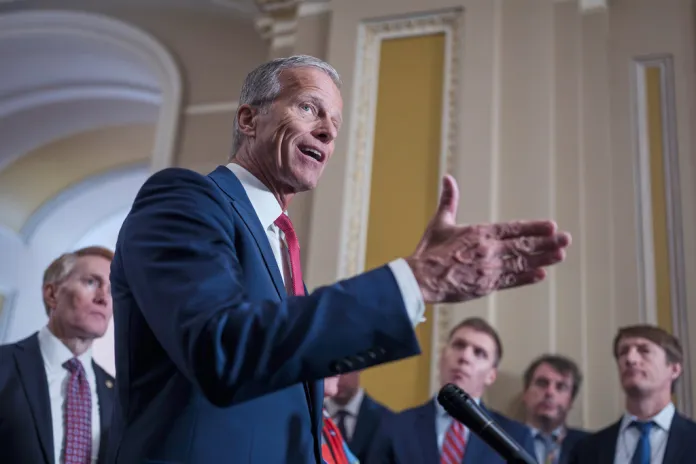


Bipartisan negotiations over Senate rule changes to fast-track presidential nominees crumbled Thursday, leading to a dramatic showdown on the chamber floor and Republicans barreling ahead with the latest step to eventually bypass Democratic roadblocks.
The GOP-led Senate moved to lower the 60-vote threshold for a resolution containing dozens of nominees, which aims to modify chamber rules to bundle an unlimited number of certain nominees for swift confirmation, to a simple majority. The endeavor cleared along party lines, 53-45.
Recommended Stories
- Republicans boost Democrats' demands to extend Obamacare subsidies
- Schumer forces Epstein files vote in Senate with NDAA amendment
- Bipartisan group of senators introduces bill to provide transparency for student loans
While the procedural maneuver was successful, the official rule change will not receive final passage until Monday, setting up confirmation for the 48 lower-level nominees tied to the resolution as soon as Wednesday.
The vote came after hours of talks between the two sides that devolved into a blame game on the Senate floor, resulting in Democrats rejecting a counterproposal from Republicans based on a modified rules change Democrats pushed in years past.
“How much time is enough?” Senate Majority Leader John Thune (R-SD) said in floor remarks. “The proposal that we are voting on, or want to vote on … has been around for two years. Introduced by Democrats.”
Sen. Brian Schatz (D-HI), a Democratic leadership member who is set to become the No. 2 Senate Democrat in the next Congress, accused Republicans of insincere gestures to reach a bipartisan deal and pleaded for more time for Democrats to find agreement on a counterproposal.
“What they’re asking for is unanimity, and we don’t have it,” Schatz said on the floor. “So, if you’re interested in enacting this on a bipartisan basis, there’s a process for doing that. It is available to you. But again, it’s more a matter of running out of patience than running out of time.”
The alteration, known as the “nuclear option” for using only a simple majority, will allow Republicans to rapidly clear the backlog of roughly 150 nominees in large groups and will apply only to sub-Cabinet and nonjudicial nominees such as ambassadors, assistant and undersecretaries, and directors of various boards and agencies.
Thune offered Democrats a one-time alternative: a rule change to allow only 15 nominees en bloc who pass through the same committee, a variation of a Biden-era proposal pushed by Sens. Amy Klobuchar (D-MN) and Angus King (I-ME) that would have bundled 10 nominees at a time. Schatz objected to a unanimous consent request from Sen. James Lankford (R-OK) to advance the alternative, prompting Thune to forge ahead with Republicans’ original intent.

Democrats, who have diverged from norms under past administrations and refused to confirm any Trump nominees via unanimous consent, are vowing retaliation when they retake the majority. They say Trump’s “historically unqualified” nominees and other actions taken by the administration that they oppose warrant the blanket opposition.
“I warn my Republican colleagues, they will come to regret this move because what goes around comes around,” Schumer said in recent floor remarks. “They may not like being on the receiving end of the changes they will bring to bear this week.”
THUNE TO LET GOP SENATORS NIX ‘BAD APPLE’ NOMINEES UNDER NEW SENATE RULE CHANGE
In an interview with the Washington Examiner this week, Thune vowed to preserve the power of his GOP members with “protocols” for how leadership advances batches of nominees that may contain individuals with whom a Republican senator may oppose. The pledge preserves any one Republican’s ability to place a so-called “hold” to prevent a nominee from moving forward, but the rule change would all but diminish Democrats’ minority powers to slow-walk individual picks.
“There’s always going to be a bad apple,” Thune said. “We don’t want to diminish or minimize our colleagues’ opportunity to do that.”
